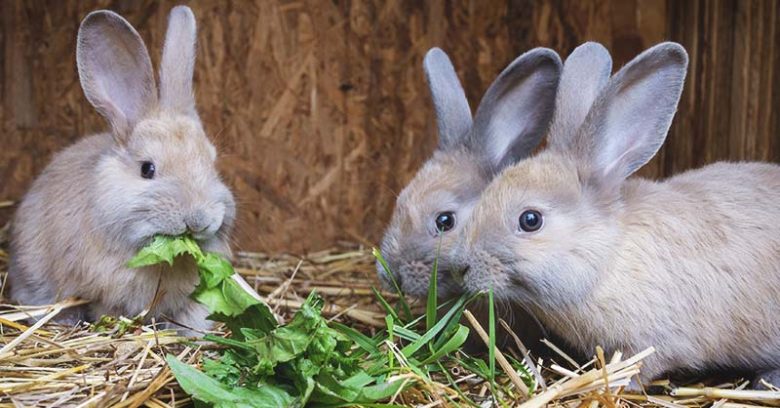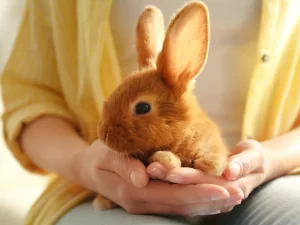Rabbits make great pets with their cute floppy ears and friendly personalities. However, giving your animal friends a hut and some carrots is not enough to ensure their health. In this guide, we discuss the important steps you can take to keep your rabbit happy and healthy.
1. Valid Housing:
Rabbits need a safe and comfortable living environment to be healthy. Choose a box large enough for your rabbit to run around in. Make sure there is plenty of air circulation and that your pet is protected from the elements. Instead, indoor cages or pens are a good choice because they keep animals safe and allow them to interact with each other.
2. Healthy Eating Habits:
Rabbits have special nutritional needs and a varied diet is important for their health. Hay should be the most important food they eat because it helps them digest their food and keeps their teeth healthy. Add fresh vegetables such as carrots and leafy greens to the food and provide them with high-quality rabbit food. Eating too many fruits and vegetables that are high in calcium can harm your health.
3. Freshwater:
Make sure your rabbit always has access to clean, fresh water. Staying hydrated is important for their health, and not drinking enough water can lead to many problems, such as bladder problems. Make sure the water is easily accessible and changed regularly to prevent it from becoming dirty.
4. Chew Toys:
Rabbits’ teeth are always growing, so providing them with the right chew toys is important for their dental health. You can get wooden toys, untreated willow branches, or special rabbit games. This not only keeps your teeth healthy, it also keeps your mind active.
5. Interaction With Others:
Rabbits are very social animals and enjoy being around other rabbits. If you can, consider getting more than one rabbit so they don’t get lonely. Gently pet and play with your rabbit and spend quality time together. But remember: every rabbit is different, and some prefer to be left alone.
6. Visit Your Vet Regularly:
Make appointments with your small animal doctor for regular checkups. Annual visits can help detect any health problems early. Make sure your rabbit has received all his vaccinations and talk to your vet about spaying or neutering as an option to stop bad habits and health problems.
7. Grooming:
Depending on the breed, rabbits may need regular grooming to prevent coat tangles and hairballs. Gently comb your rabbit’s coat, especially if it is shedding. Also, make sure to check the nails regularly and trim them if necessary. Grooming your rabbit properly will help you relax and focus on your overall health.
8. Cleaning Training:
You can teach rabbits to use a litter box so that cleaning up afterward is easy. If you place a litter box in a corner of the cage, most rabbits will use it without noticing. Use rabbit-safe flooring and clean the litter box regularly to keep it clean.
9. Safety Times Outside:
Rabbits are safer indoors but can benefit from time outside under supervision. Make sure your outdoor space is safe, free of poisonous plants, and away from animals that could harm you. Let your rabbit nibble on the safe grass and look around, but always keep a close eye on him/her.
10. How to Read Body Language:
It’s important to read your rabbit’s body language so you can meet his needs and prevent him from becoming stressed. Learn to recognize signs of joy, fear, or pain. When the rabbit is calm, it may fall over or purr. When he is nervous, he may bump into or dodge things. With this information, you can ensure that your rabbit lives in a happy, stress-free environment.
Conclusion
Caring for rabbits requires dedication and an understanding of their specific needs. You can ensure that your rabbit lives a happy and healthy life by providing him with a comfortable home, healthy food, regular veterinary care, and lots of love and attention. As you learn more about your rabbit’s behavior and needs, you will have a happy, healthy pet.
FAQs
1. Where is the best place for rabbits to live?
Rabbits should live in a large cage or indoor box where they can move freely. Provide good air circulation, protection from the elements and a comfortable space.
2. What should I give my rabbit?
For good digestion and oral health, rabbits should eat mainly hay. To supplement, add fresh vegetables, high-quality rabbit food and some fruit. Stay away from vegetables with high calcium content.
3. How Much Water Do Rabbits Need?
Always provide clean, fresh water. Rabbits need to drink plenty of water to stay healthy, and water should be readily available. To prevent the water from becoming dirty, you should change the water regularly.
4. Do Rabbits Need Chew Toys?
Yes, rabbits need the right chew toys to keep their teeth healthy and their minds active. You can get wooden toys, untreated willow branches, and special rabbit games.
5. Do rabbits need other rabbits?
Rabbits are very social animals and enjoy being around other rabbits. If you can, consider getting more than one rabbit so they don’t get lonely. Take the time to get to know your rabbit through touch and play.
6. How often should I take my rabbit to the vet?
Make an appointment with your small veterinarian once a year for a check-up. Regular visits to your doctor can help detect health problems early. Talk about vaccination and neutering options.


